Back Home From Iraq With John Bruhns By Michael Slenske
Saturday, May 12th, 2007Michael Slenske's last Back Home From Iraq feature was on Sean Huze.
“I think the real power from veterans comes from their experiences. When just regular vets have their voices heard. When the administration says one thing and they say, ‘Wait a minute, we’ve experienced something totally different.’”
If you ask John Bruhns, he’s “no hero.” Even though he switched his non-combat MOS (military occupational specialty) to an active duty infantry unit after 9/11 because he viewed it as his “generation’s Pearl Harbor and wanted to fight.” He wanted to fight even though his Kansas-based infantry unit stormed Baghdad in the initial invasion. He wanted to fight even though he then spent the next year training the new Iraqi military and delivering detainees to Abu Ghraib prison. He wanted to fight even though his unit was responsible for responding to any violent activity in the Baghdad area, handling “forward-operating security, foot patrols, Bradley patrols, Humvee patrols, searches and seizures, raids, you name it.” To him that’s just par for the course for your average Army Sergeant in Iraq.
But it doesn’t take a Medal of Honor to be a war hero. And that might explain how Bruhns, who now works in veterans advocacy with VoteVets in the Washington, D.C. area, became the subject of MoveOn.org’s new Oliver Stone-directed ad calling for a stop to the war. As part of its VideoVets project, MoveOn interviewed 20 Americans—vets and their families—asking why the war needs to end. While all of the videos are moving and certainly worth viewing, Bruhns’ came out on top when MoveOn members cast votes for their favorite earlier this month.
“I actually didn’t think my video was the best one,” says Bruhns, a moderate, if modest, Philly native who started speaking out against the war and even testified before Congress about the truth on the ground in 2005. “I think what stood out about my video was that there wasn’t really anything political about it. It was a simple video about a soldier who went to Iraq. My experience in Iraq totally conflicted with what the administration presents to the American public. I just portrayed that I wasn’t fighting terrorists over there, I was just fighting Iraqi people. And I think that had a lot of power.” SMITH caught up with Bruhns when the ad went on the air and found that you can staunchly oppose the war without opposing the troops in the slightest.
You started speaking out immediately when you got back home. What prompted that?
When I was in Iraq I realized there were no weapons of mass destruction, they had nothing to do with 9/11—the Iraqis, Saddam—nothing to do with al Qaeda. So basically every reason they sent us in there for they were wrong about. And I kept hearing the justification for the war and the justification from the administration was, “This is the central front in the war on terror, we’re fighting terror, we’re fighting al Qaeda. These are the people that we’re fighting.” And I was looking around saying, “Not me.” The people of Iraq are trying to attack me, because they don’t want me here, they hate me. That was my experience. There wasn’t any al Qaeda. I don’t want to sound redundant, but that’s how it was.
How did you first get your voice heard?
After I got out of the service I relocated to the Washington, D.C., area, and I started knocking on doors trying to get any members of Congress to listen to me. And I really didn’t get their attention until June of 2005. There was an “Out of Iraq” Congressional Hearing. There was the far-left liberal groups there, and I didn’t belong to that. I don’t
have anything to do with that element. But I approached Congresswoman Barbara Lee. I said, “Listen, I was a soldier over there, and I could offer some insight of what the reality of the situation on the ground is.” She was leaving the hearing room and told one of her assistants to get me a chair. I sat down and started telling my story, what I saw. We exchanged information, and I was contacted by one of Maxine Waters’ assistants, and he said, “Could you come to another hearing and testify about your experience there?” I put together a written statement for him that I read at the second part of the hearing. After that, Marcy Kaptur took my speech over to the House and read a portion of it on the House floor.
Would you say you’re involved in the anti-war movement?
I’m not anti-war at all. I can’t help how people see me on television or people see things I write on the Internet, and they put them on their blogs. There’s nothing I can do about that. But I am not anti-war, I’m not a pacifist, I’m just against the Iraq war. I’m against this war.
How do you feel about the current anti-war movement?
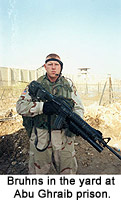 I personally disagree with the mentality of soldiers who return home from Iraq and wear half of their uniform with a pair of jeans or Hawaiian shorts. And they put black magic marker on their desert camouflage top and try to revive that type of 60s anti-war movement. I think it’s more effective if you conduct yourself in a professional manner and speak rationally and coherently and share your experiences in a professional way. I think that will get you further than if you go to Capitol Hill and disrupt a hearing and get arrested.
I personally disagree with the mentality of soldiers who return home from Iraq and wear half of their uniform with a pair of jeans or Hawaiian shorts. And they put black magic marker on their desert camouflage top and try to revive that type of 60s anti-war movement. I think it’s more effective if you conduct yourself in a professional manner and speak rationally and coherently and share your experiences in a professional way. I think that will get you further than if you go to Capitol Hill and disrupt a hearing and get arrested.
What’s the difference between the anti-war movement in Vietnam and the one to stop the Iraq war?
Right now you have so many different groups. You have Iraq Veterans Against the War. My main problem with that organization is that they allow vets in their organization who’ve never been to Iraq to call themselves Iraq vets. I get disgusted by that. Why are you out on the street calling yourself an “Iraq vet against the war” when you haven’t been there and had not had to endure the hardships we (Iraq Vets) had to endure? I don’t want to get in a quarrel with IVAW. I don’t believe in pitting vets against vets, especially because both of our organizations share the common goal of bringing the war to an end…we just operate differently.
The difference between VoteVets and an organization like Iraq Vets Against the War is that they’re an anti-war, pacifist organization and they strongly resemble the anti-war movement of the late 60s and early 70s. At VoteVets we’re a solid group of veterans who conduct ourselves professionally, we’re not anti-war, we’re pro-military, and we believe in fighting for this country. The war in Afghanistan was right. Iraq was the wrong thing to do. The time for more troops, that ship has sailed. Now it’s just how we’re going to get our troops out reasonably and responsibly. You can’t say we’re going to give Iraqis democracy with 130,000 troops, and when that doesn’t work say, “Okay, we’re going to send in 30,000 more.” They have to want it for themselves. We completed our mission a long time ago. To keep them there indefinitely is irresponsible.
Do you think we’re having a problem affecting change because we’ve been clouding the personal narratives with politics?
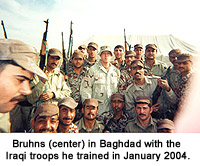 In a way it is. A lot of veterans feel strongly about the policy, how the administration is conducting the war. It’s not a good policy. In a sense politics somehow gets into the discussion. But I think the real power from veterans comes from their experiences. When just regular vets have their voices heard. When the administration says one thing and they say, “Wait a minute, we’ve experienced something totally different.” I think that appeals more to the American public, because we’re not foreign policy experts. I don’t have a master’s degree in political science. We’re not all Capitol Hill staffers or elected officials. But what we do have is our experience, and no one can take that away from us.
In a way it is. A lot of veterans feel strongly about the policy, how the administration is conducting the war. It’s not a good policy. In a sense politics somehow gets into the discussion. But I think the real power from veterans comes from their experiences. When just regular vets have their voices heard. When the administration says one thing and they say, “Wait a minute, we’ve experienced something totally different.” I think that appeals more to the American public, because we’re not foreign policy experts. I don’t have a master’s degree in political science. We’re not all Capitol Hill staffers or elected officials. But what we do have is our experience, and no one can take that away from us.
Oliver Stone directed the MoveOn ad with you and Ron Kovic. What was it like working with them?
I think Oliver Stone and Ron Kovic both care deeply about veterans. I might not share all the views they have, but we do all support the troops 100 percent. Oliver Stone acknowledges the current situation in Iraq is not working. I think he sees similarities between Iraq and Vietnam. This bothers him, this situation in Iraq, and it compelled him to participate in this project. I think the link comes by the fact that they’re both veterans. Oliver Stone is a pretty big name in the film industry but he volunteered, served his country honorably in Vietnam. He received two purple hearts and a bronze star. Oliver Stone is a hero. I’m not. I’m no hero. I just went, and I saw, and I came home, and I’ve been speaking out about my experiences. Ron Kovic might not have the same ideologies as I do, but the guy took three bullets and gave three quarters of his body to his country. As far as I’m concerned he’s more than earned his right to his opinion. And I respect his opinion.
Have you got any feedback on the VideoVets ad yet?
Sure. I was on my way back home from L.A. and somebody stopped me in the airport and said they saw the Oliver Stone segment on CNN. They thanked me for speaking out. And one of my neighbors stopped me in the parking lot when I was getting my mail and thanked me for what I was doing. At the same time, those are just two examples. I totally acknowledge that there are a lot of people out there who disagree with it and who are going to try and turn it around on me and make it look like I’m not supportive of the troops and that I’m some sort of turncoat, which I think is ridiculous.
How does that work? Don’t troops have the moral authority here?
Ever since we invaded Iraq. I think in the very beginning of the war the Bush administration was very successful in selling the war to the American people when we first went in there. Tim Russert just outlined it when he was talking with George Tenet, and Russert put a poll up that said 70 percent of the American people had approved of the initial invasion. They scared the public into believing Saddam was an imminent threat, and then when we went into Iraq, you had Shock & Awe, and you saw pictures of soldiers in the streets, fighting in Iraq. You had people in the streets beating their chests and waving their flags. Then you have this image of the Saddam statue getting ripped down. Everybody felt so patriotic. Anybody who criticized the war was anti-troops. The administration hid behind the troops, they hid behind the flag, and made it almost impossible to confront them on Iraq. But now it’s just so blatantly obvious that they misled us into war, and if they didn’t mislead us they were just dead wrong about everything, just wrong and incompetent.
Were you expressing this to troops you were there with on the ground?
To my close friends, yes.
Did they share your sentiments?
Not at the time.
What about people back home?
I remember I went to a Kerry-Edwards rally in 2004 in Kansas City. This is a really important story. I was probably the only soldier from Ft. Riley who’d gone there. And when I got there I got surrounded by a group of young men. They were carrying signs that said, “Vote For Bush,” and they saw that I had a Kerry-Edwards button on my shirt. They called me a traitor, told me to move to France. They told me I support terror. They told me to get out of this country. That I don’t deserve to live here. And I’d just come back from Iraq and that was what they said to me, “Get out of this country and move to France.”
Did you have a response?
I bit back pretty hard, hard enough for them to leave me alone. I took a little bit of heat in my unit because I supported John Kerry and John Edwards. I put a sticker on my car, but I didn’t really care. I find it really fascinating that your average army infantry grunt or Marine grunt could identify with the likes of George W. Bush and Dick Cheney. These are two guys, both of them, that went way out of their way to avoid the war in Vietnam. And 40 years later these guys find themselves in a position of power and start a Vietnam of their own. And then when anyone disagrees with them they fire back with, “You don’t support our troops.”
The nature of the VideoVets project suggests that the public still doesn’t get something about the war. What stories of your own speak to that notion?
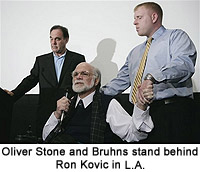 There was a night in Iraq where a roadside bomb had gone off and it disabled one the Humvees our scout platoon was driving around. Luckily nobody was injured. Part of my job was to respond to any disturbance in the area, so they called my squad out there, and some of the local Iraqis said that the people who planted the bomb were in the house next door to them. So we went in the house fast and furious, gathered all the people in the house and put them in the living room. There was a diverse crowd—some old men, some women, some children, there were some men in their 30s, and some teenage boys. Everybody was scared. I wasn’t scared. I could tell we definitely had the upper hand. We had 10 troops in there, locked and loaded, fingers on the trigger, and we had this machine that could detect bomb-making residue on the hands of insurgents.
There was a night in Iraq where a roadside bomb had gone off and it disabled one the Humvees our scout platoon was driving around. Luckily nobody was injured. Part of my job was to respond to any disturbance in the area, so they called my squad out there, and some of the local Iraqis said that the people who planted the bomb were in the house next door to them. So we went in the house fast and furious, gathered all the people in the house and put them in the living room. There was a diverse crowd—some old men, some women, some children, there were some men in their 30s, and some teenage boys. Everybody was scared. I wasn’t scared. I could tell we definitely had the upper hand. We had 10 troops in there, locked and loaded, fingers on the trigger, and we had this machine that could detect bomb-making residue on the hands of insurgents.
Everybody was saying, “Should we arrest these people?” And I noticed everybody was scared except for one person. There was a kid in there, maybe 13 or 14 years old; and when I looked at that kid he scared me to death. Because when I looked at his face I saw that he had no fear at all, none. He looked like if he had the chance he would slit my throat right then and there. So I ordered him to be arrested, and they took that kid into custody. They said, “Why?” I said, “Look at him.” He was fearless and had this disgusted look on his face. So they took him back to our unit and our soldier tested his hands and radioed back to our company that he had the highest reading for bomb-making material that the machine had ever got. And this was a kid. A 13-year old kid. He was not al Qaeda, he was not a Baathist. He was a teenage boy who was making bombs and setting them off in our sector trying to kill U.S. soldiers. Now, George Bush will stand up on TV and say, “This is the central front in the War on Terror.” And a lot of the American people just don’t realize that’s not the reality of the situation there.





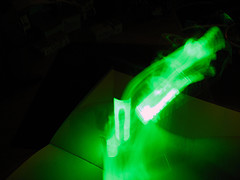 If you love true stories well told, I’m sure you have
If you love true stories well told, I’m sure you have 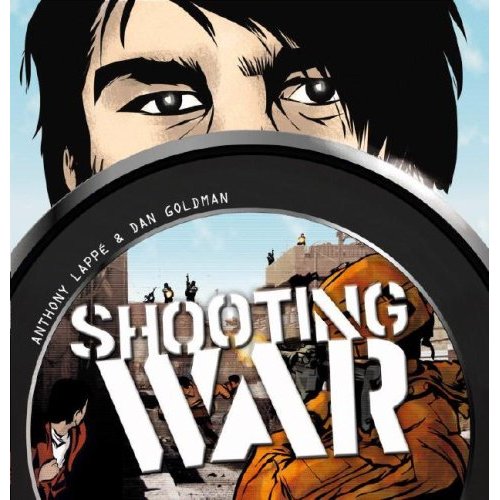
 A few weeks ago, a friend told me that she found the stack of books on the whitewashed mantlepiece-type thing that I use as a bedside table aesthetically pleasing. I was glad she said that, because I thought that my book stack had been lookin’ especially good recently, too—mostly thanks to the addition of Zak Smith’s “Pictures Showing What Happens on Every Page of Thomas Pynchon’s Novel Gravity’s Rainbow,” which has a chunky red spine that is super hott.
A few weeks ago, a friend told me that she found the stack of books on the whitewashed mantlepiece-type thing that I use as a bedside table aesthetically pleasing. I was glad she said that, because I thought that my book stack had been lookin’ especially good recently, too—mostly thanks to the addition of Zak Smith’s “Pictures Showing What Happens on Every Page of Thomas Pynchon’s Novel Gravity’s Rainbow,” which has a chunky red spine that is super hott.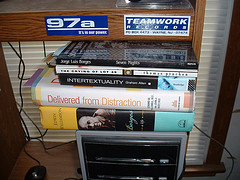 As a postscript, isn’t it interesting that as media become digitized, our media consumption habits leave less and less of a physical trace? From LP covers on the wall to CDs to a pixellated, ever-changeable list of names on the ol’ iPod. From books and magazines to…well, nothing’s replaced books and magazines for me yet. It’s strange to wonder if anything ever will.
As a postscript, isn’t it interesting that as media become digitized, our media consumption habits leave less and less of a physical trace? From LP covers on the wall to CDs to a pixellated, ever-changeable list of names on the ol’ iPod. From books and magazines to…well, nothing’s replaced books and magazines for me yet. It’s strange to wonder if anything ever will.

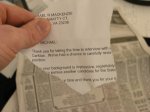

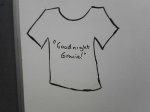
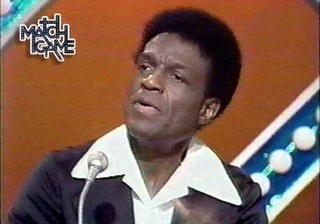 My worldview was narrowly illuminated by the nurturing glow of television. At the time, one of my favorite programs was
My worldview was narrowly illuminated by the nurturing glow of television. At the time, one of my favorite programs was 


